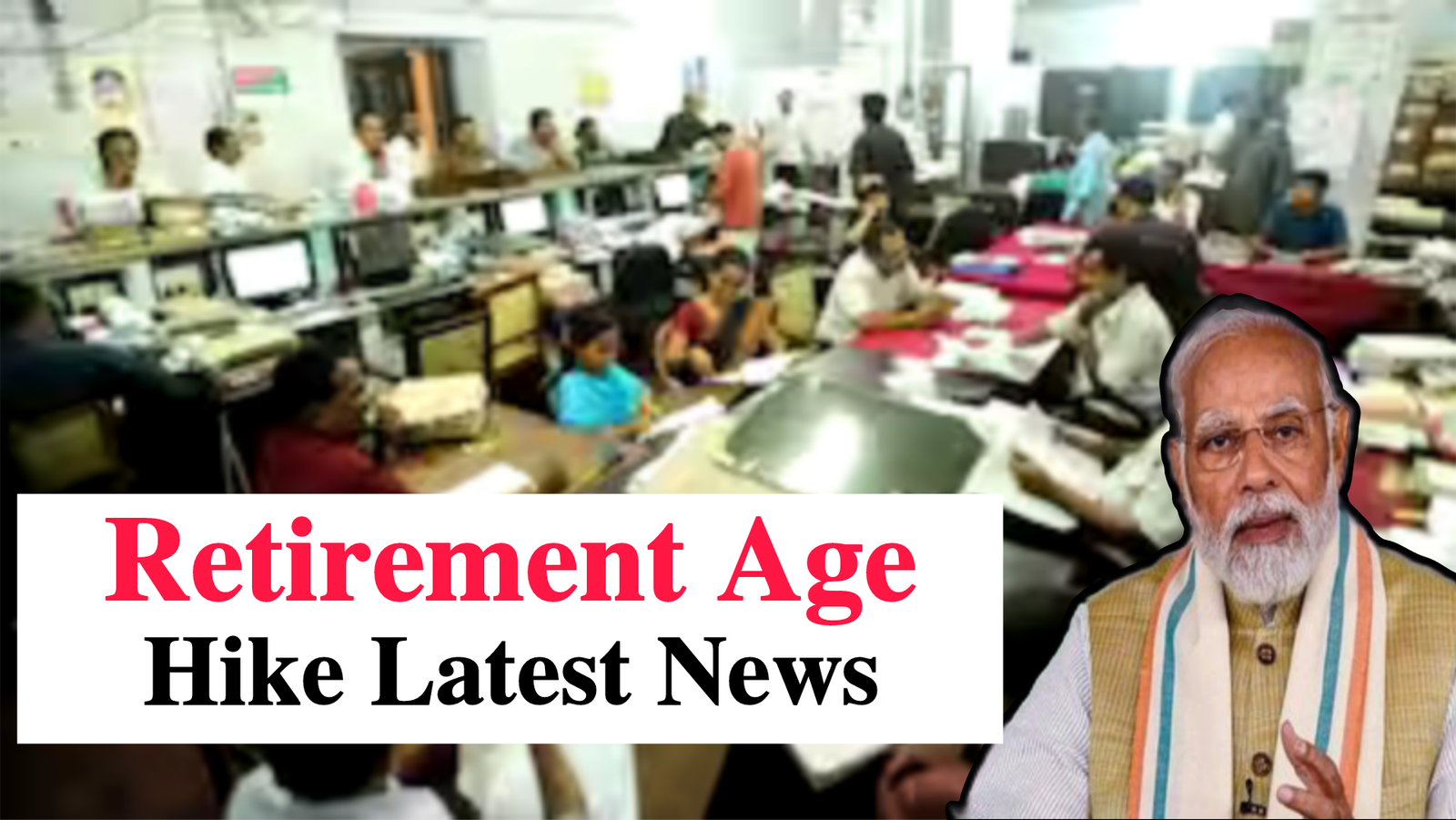Retirement Age : If you are also a central government employee, then an important update has been released which directly concerns your retirement age. This issue has been widely discussed among employees for a long time and now the government has officially given its stance in writing. Since retirement is one of the most crucial aspects of every employee’s career, this clarification holds a lot of significance. In this detailed article, we will carefully examine the latest developments, the government’s response, and what it really means for central employees.
Retirement Age: Growing Speculation About Retirement Age
In recent times, discussions about a possible change in the retirement age of central government employees have been heating up. Various employee unions, social media platforms, and news channels have been speculating whether the government intends to reduce or increase the retirement age. Employees were left confused about their future, wondering if they might have to retire earlier than planned or continue in service for additional years. Such uncertainty not only created anxiety among workers but also led to a series of questions being raised directly in Parliament.
Recognizing this ongoing confusion, Members of Parliament (MPs) formally questioned the government regarding its plans. This was particularly important because any decision about retirement directly impacts not only the employees themselves but also their families, pension systems, and even recruitment of new candidates.
Retirement Age : The Government’s Official Stand
Now, the government has cleared the air on this issue. According to the written reply submitted by Union Minister Jitendra Singh, there is no proposal to either increase or decrease the retirement age of central government employees. The rules that already exist will continue to remain in force. This clarification has effectively ended all speculation and brought much-needed relief to employees who were uncertain about their future.
Currently, the standard retirement age under the rules is 58 years, although in some departments and cadres it may vary slightly depending on specific service conditions. The government has clearly mentioned that there is no new plan to amend these age limits.
Retirement Age: Why the Question Was Raised
The issue gained importance when some MPs asked the government whether it was considering new schemes regarding early retirement or delayed retirement. The questions specifically pointed out two scenarios:
- Whether the government was planning to introduce a new policy for early retirement (before the fixed age).
- Whether employees willing to work beyond the fixed retirement age would be allowed to opt for late retirement.
In both cases, the government’s response was a clear “No.” The Minister emphasized that the existing rules already provide sufficient provisions for employees who wish to retire early, and there is no scheme under consideration for extending service beyond the already established age limits.
Rules Under Civil Service Pension Regulations
It is important to note that under the Central Civil Services (Pension) Rules, 2021 and the All India Services Rules of 1958, employees already have the flexibility to opt for early retirement if they wish. For example, employees who have completed a certain number of years of qualifying service can voluntarily retire before reaching the official age of superannuation.
This is known as Voluntary Retirement Scheme (VRS). Employees may choose VRS for personal reasons such as health issues, family commitments, or simply the desire to leave service early. The rules provide them with this option, subject to approval by the concerned authorities.
Therefore, the government clarified that since such provisions already exist, there is no need to create a fresh framework for early retirement.
Why the Retirement Age Remains Unchanged
There are several reasons behind the government’s decision to keep the retirement age unchanged:
- Stability of workforce: A sudden increase or decrease in retirement age would disturb the balance of recruitment and promotions. If retirement age is raised, younger candidates may face delays in promotions and job opportunities. If reduced, there might be a shortage of experienced officers.
- Financial implications: Any change in retirement age affects pension liabilities and government expenditure. By maintaining the current rules, the government avoids unnecessary financial strain.
- Existing flexibility: Since employees already have the option of voluntary retirement, the government believes there is no immediate need for additional flexibility.
Early Retirement: An Existing Option
As mentioned earlier, the rules already allow employees to take early retirement. This option is generally taken by those who face health challenges, want to manage family responsibilities, or simply wish to leave service before the compulsory retirement age.
Under these rules, an employee who has completed 20 years of qualifying service may submit a notice for voluntary retirement. Similarly, in certain exceptional cases, early retirement can be taken even earlier with proper approvals.
This ensures that employees who genuinely wish to step away from service before the official age can do so, while those who wish to continue until 58 (or the prescribed age for their cadre) can complete their tenure normally.
No Scope for Delayed Retirement
On the other hand, the idea of extending the service period beyond the current retirement age was also raised in Parliament. Some wondered whether employees could be given the option to work for extra years if they were physically fit and willing.
The government, however, ruled this out entirely. Minister Jitendra Singh categorically stated that no such proposal exists and the retirement age will not be increased under any circumstances.
This decision ensures uniformity across services and avoids creating disparities among employees. It also keeps promotion opportunities open for younger officers and ensures smooth entry for fresh candidates into government service.
Employees’ Reaction
The government’s clarification has brought mixed reactions among employees. On one hand, those nearing retirement now have clarity about their future and can plan their finances without uncertainty. On the other hand, some employees who hoped for an extension in retirement age feel disappointed.
However, overall, the majority of employees welcome this decision because it ends confusion and speculation. Knowing that the retirement age remains unchanged allows them to focus on their work and prepare for retirement without waiting for new rules.
What This Means for Central Government Employees
In simple terms, the retirement rules remain unchanged.
- Normal Retirement Age: 58 years (with some variation depending on department/cadre).
- Voluntary Retirement: Allowed under existing rules, usually after completing 20 years of service.
- No Early Retirement Scheme: Other than VRS, no new scheme is being introduced.
- No Delayed Retirement Scheme: Employees cannot extend service beyond the fixed retirement age.
- Old Rules Apply: All retirement-related provisions remain the same as before.
Conclusion
The government’s official response makes it crystal clear that there will be no change in the retirement age of central government employees. All speculation about reducing or increasing the age has now been put to rest.
Employees can retire at the standard age of 58 (or as applicable in their cadre), or they may opt for voluntary retirement under existing rules if they wish to leave service earlier. Beyond that, no new flexibility is being offered.
This decision ensures stability, financial balance, and fairness within the system. While some employees may have hoped for changes, the continuation of existing rules ultimately brings certainty, which is essential for long-term planning.
In short, the retirement rules remain the same, and central government employees should plan their careers and post-retirement life accordingly



